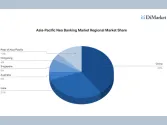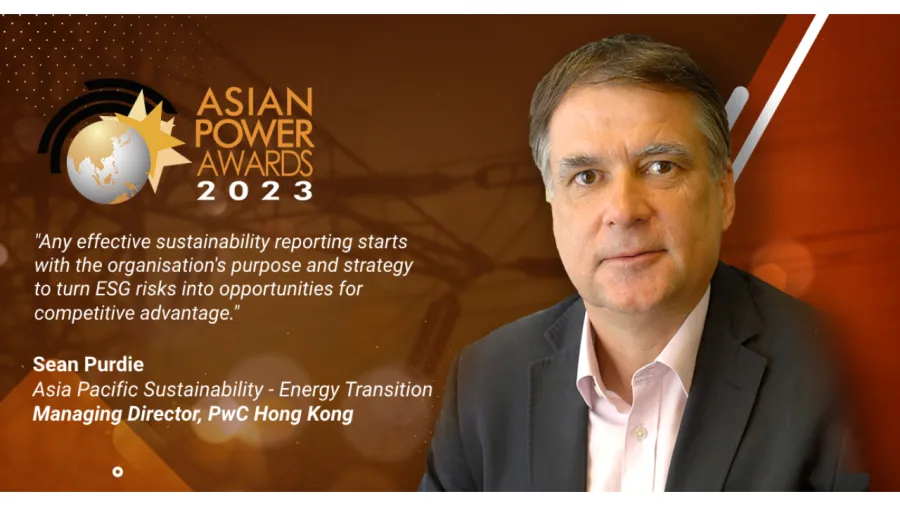
Effective sustainability reporting aligns purpose and strategy, leveraging ESG risks for competitive advantage – PwC’s Sean Purdie
Companies can gain competitive advantages by focusing on their operations, human capital, data management, supply chain, and more, aligning these with evolving regulations and risks.
Energy transition in Asia represents a pivotal and transformative journey as the region grapples with the dual challenges of surging energy demand and the imperative to combat climate change. With its growing population and rapidly expanding economies, Asia plays a central role in the global energy landscape.
The transition towards cleaner, more sustainable energy sources is no longer a mere option but an urgent necessity. Asian nations are increasingly embracing renewable energy technologies, such as solar, wind, and hydropower, whilst also exploring innovative solutions like energy storage and grid modernisation.
Sean Purdie, Asia Pacific Sustainability, Managing Director, Energy Transition, PwC Hong Kong, has nearly 25 years of experience in the power and energy sectors.
Purdie's impressive career has been dedicated to the Asia Pacific power and energy sectors. Having resided in Hong Kong since 2000, he has held various regional roles that have culminated in his current position as Managing Director for Energy Transition in the Asia Pacific Sustainability team at PwC. Prior to joining PwC in 2022, Sean served as the Market Sector Lead and Managing Partner for Power in the Asia Pacific region at ERM, starting in 2013. His extensive knowledge spans the low-carbon energy transition and markets, regulations, disclosure requirements, and renewable and alternative energy technologies within the Asia Pacific region.
In his recent interview with Asian Power, we delve into Sean Purdie's background and glean his key insights about the evolving perceptions of ESG factors, challenges, and opportunities in the energy sector, as well as the role of sustainability in shaping the future of the Asia Pacific energy landscape.
In your career spanning nearly 25 years in the Asia Pacific power and energy sectors, you must have witnessed significant changes. How has the perception of ESG (Environmental, Social, and Governance) factors evolved amongst energy industry stakeholders, and how has this impacted decision-making in the region?
The perception of ESG factors has risen significantly, particularly in recent years. Financing requirements, shareholder requests (including increased transparency regarding investments), technology advancements, and director liability have meant ESG details must be considered during decision-making.
What are some of the key challenges that energy companies, both established and emerging, are facing in today's dynamic market, and how can they leverage ESG strategies to drive growth and enhance their competitive advantage?
A company’s operational footprint brings new risks and opportunities. The amount and rate of change in technology, markets, regulations and disclosure requirements, and the subsequent risks to normal business, balanced with the emergence of new opportunities, mean ESG strategies are an increasingly large component of growth and risk management plans. Many companies now use advanced and accessible ESG strategy as one of their differentiators. Other sources of competitive advantage can come from multiple areas including the organisation’s own operations, people, data, suppliers and product/service reach that can take advantage of opportunities such as cross-border carbon tax, regulation related to environmental and labour footprint of imports/exports and disruption of the supply chain due to climate risk and the geopolitical environment.
How do you envision the future of sustainable energy development in the Asia Pacific region, and what role do you see PwC playing in shaping that future?
Sustainable energy development will increasingly play a major role in the Asia Pacific region. PwC will play its part in commercial analysis of new technologies and their impacts on markets, advisory on capital raising, M&A and financing, and supporting clients to move beyond strategy and commitment to transformation and delivering impactful improvements for climate, nature and people and to their ESG story through clearer sustainability reporting.
Transparency and reporting are crucial for companies to demonstrate their commitment to sustainable practices. How can organisations in the energy sector effectively disclose their ESG initiatives and performance to investors, customers, and other stakeholders whilst also ensuring accuracy and authenticity in their reporting?
Any effective sustainability reporting starts with the organisation’s purpose and strategy to turn ESG risks into opportunities for competitive advantage. The strategy is translated into measurable and sustainable outcomes through tailoring the right mix of metrics that are embedded in ESG governance processes, systems, and controls to fine-tune and steer the organisation’s pathway to ensure resilience as the world continues to change.
As the energy sector embraces digitalisation and emerging technologies, cybersecurity becomes a growing concern. How can the industry address these security challenges and safeguard critical infrastructure whilst also promoting innovation and efficiency?
Cybersecurity is a growing concern across the sector and must be managed as a sector. Individual companies can be secure, but given the integrated nature of the energy grid, we are only as strong as the weakest company. An example of success in the sector in Australia is the explosion in collaboration between energy market participants, with some of the more mature and advanced companies supporting the smaller ones to benefit the whole industry. The common challenges for the sector include ageing SCADA infrastructure, an ageing workforce and the sprawl of digitisation. Similarly, cyber problems in one company can be applied to many.
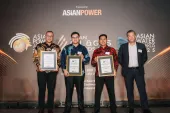



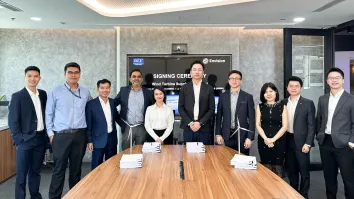
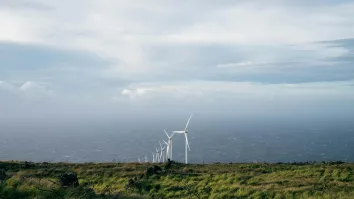













 Advertise
Advertise


